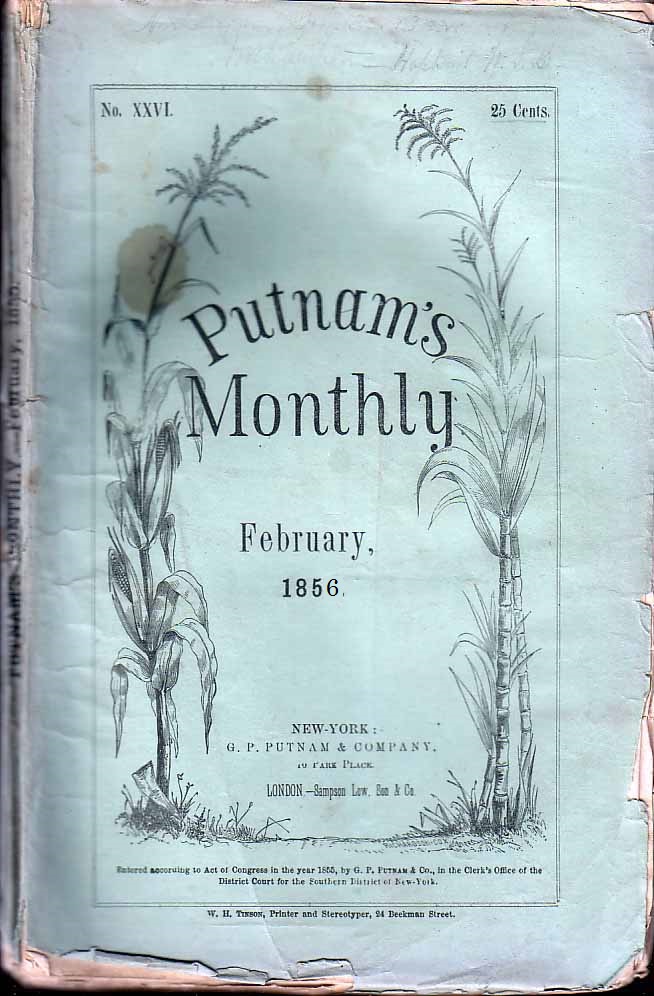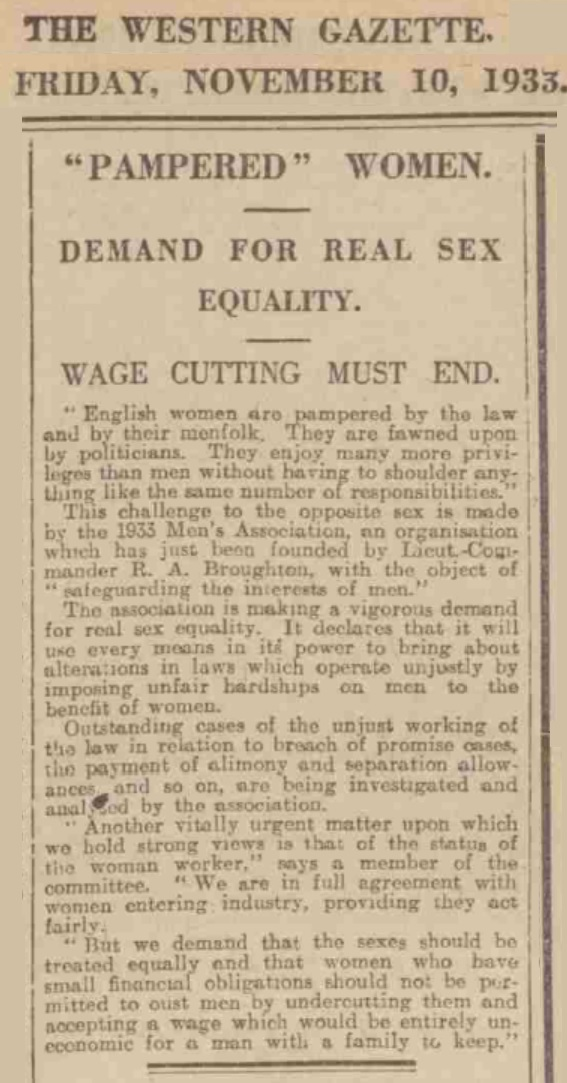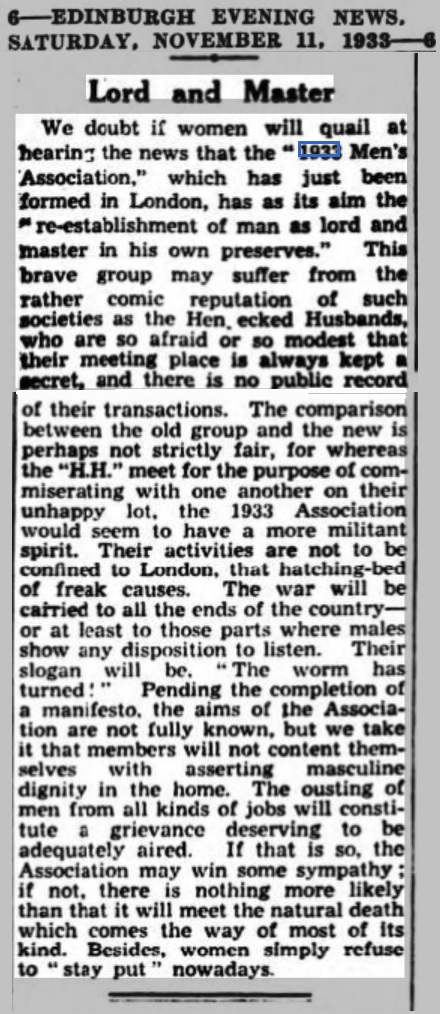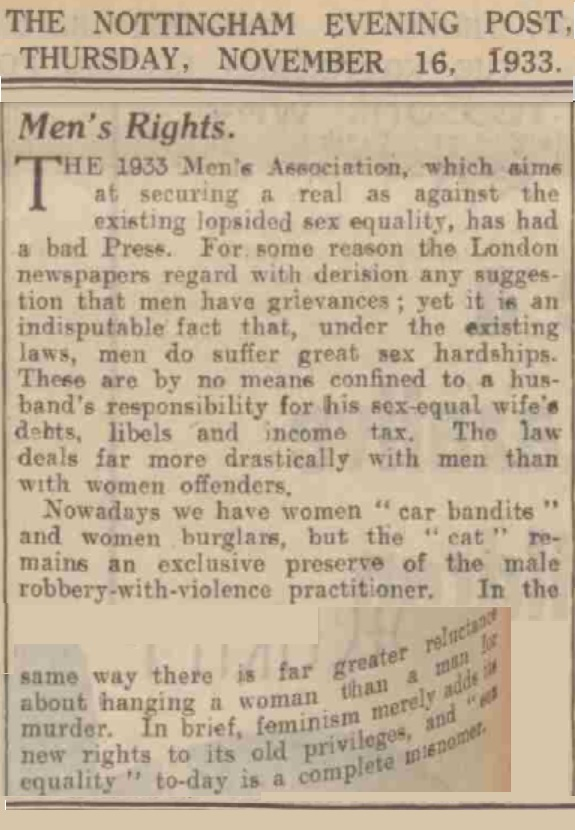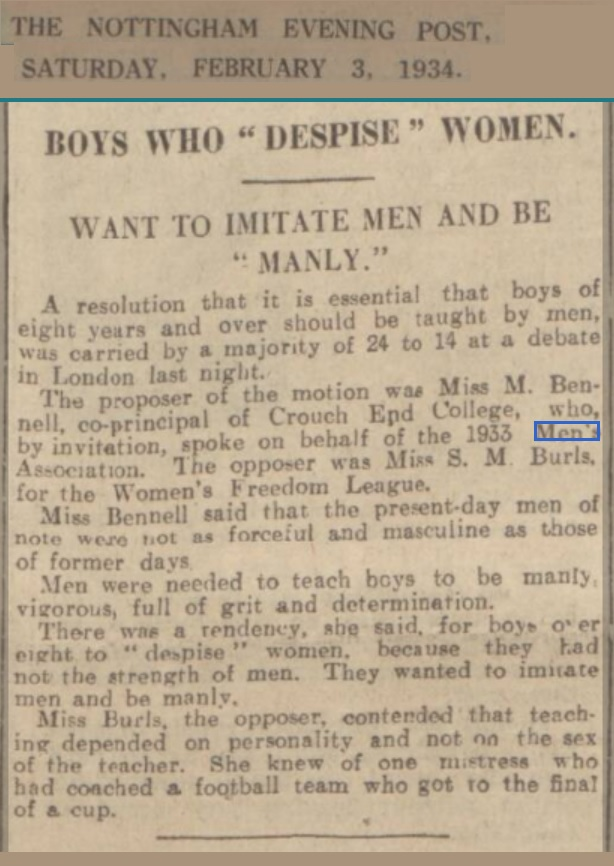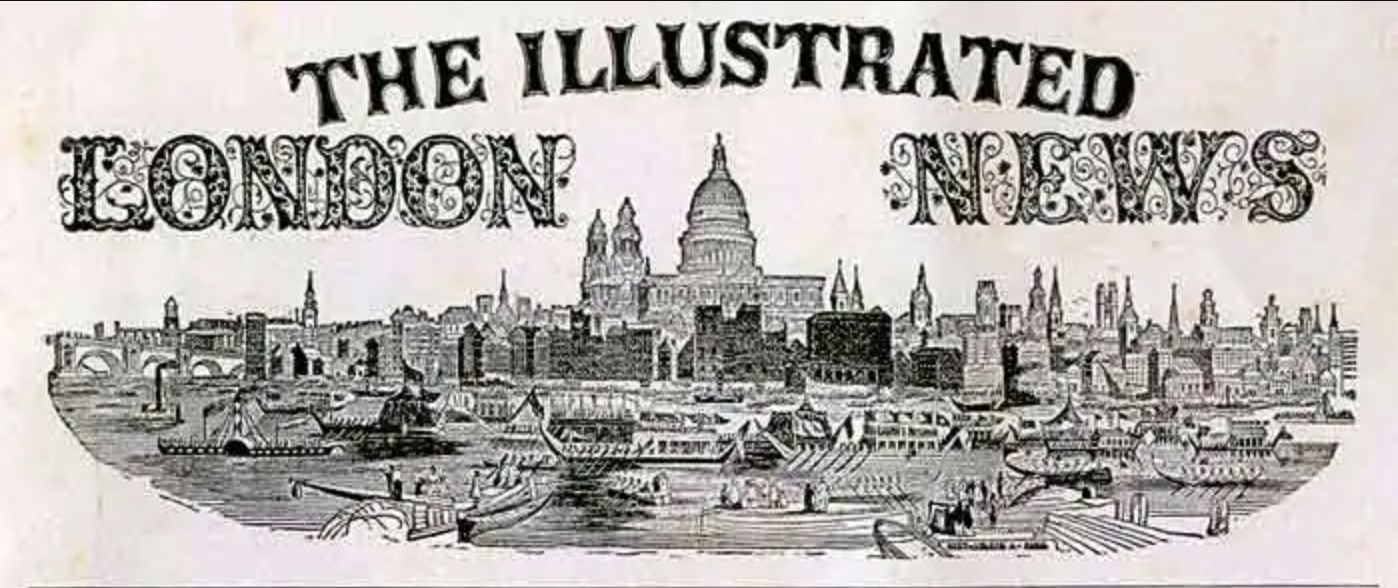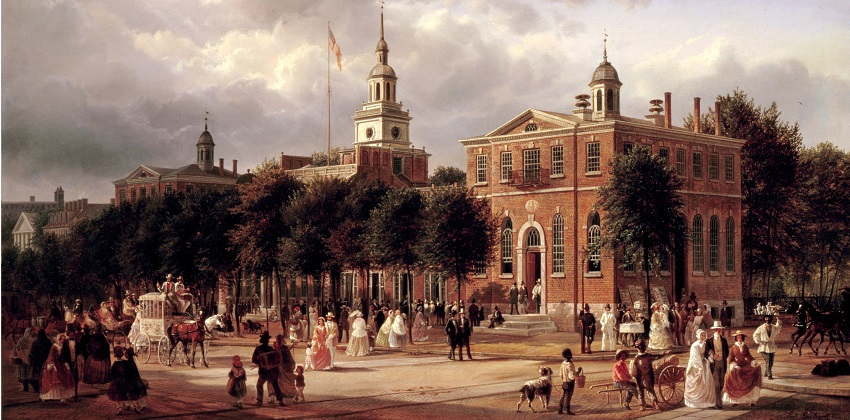
Independence Hall, site of Men’s Rights Conference in the year 1851.
In 1851 the following article was penned by Chericot in Godey’s Lady’s Book, a United States magazine for women published in Philadelphia. The article entitled Men’s Rights Convention was designed to mock proceedings of men’s rights conference held at Independence Hall. Did the conference really take place? It appears that it did, and the mocking article was an attempt to distort proceedings, engage in shaming, and dissuade men’s advocates from holding future conferences. – PW
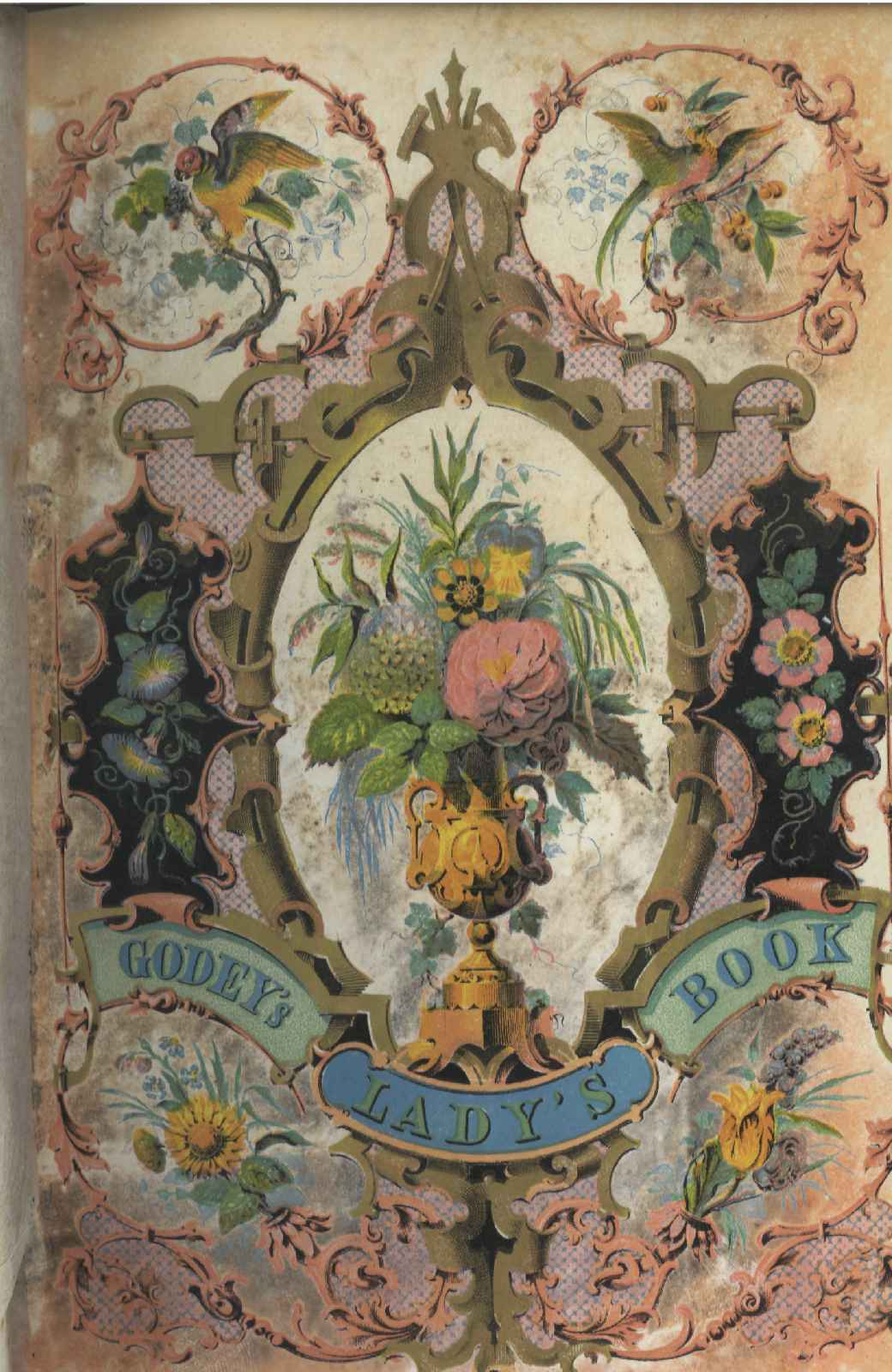
MEN’S RIGHTS CONVENTION – SEPTEMBER 20th 1851
EXTRAORDINARY PROCEEDINGS, EXCITING SCENES, AND CURIOUS SPEECHES .
FROM OUR OWN REPORTER, CHERICOT.
Yesterday, at 10 o’clock in the forenoon, an immense mass meeting of gentlemen from all parts of the country was held at Independence Hall. It was convened upon notices to that effect, which were issued directly after the late extraordinary and treasonable Female Convention at Massachusetts, and which, being distributed among the principal cities in the Union, had resulted in the collection of an enthusiastic crowd of gentlemen of all grades, trades, and politics, one common danger uniting them, in the effort to repel the proposed feminine aggression of their rights.
On taking- a survey of the meeting, one thing struck us very forcibly—the uneasy and restless anxiety that characterized the demeanor of most of the men; the slightest noise caused a general sensation; and, in one instance, the shrill cry of a fishwoman threw a gentleman into hysterics, which he explained, on his recovery, to have resulted from his mistaking it for the voice of his wife.
When the excitement had, in some measure, subsided, the meeting was called to order by Mr. Wumenheyter, of New York, who said, the first business being the choice of a president, he moved that Mr. H. P. Husband, of Maryland, be appointed.
Brass Blackstone, of Philadelphia, seconded the motion, which was unanimously adopted.
After the vice presidents and secretaries were duly chosen, and a business committee appointed to draw up resolutions expressive of the sense-of tho meeting, the president addressed the convention as follows:—
“The object which has called this great assemblage together is one which not only concerns mankind in general, but Americans in particular. This is emphatically a land of liberty — liberty which, achieved by the exertions of our forefathers, has commanded the respect of the tyrannical governments of the Old World, and resisted all unhallowed attempts to subvert it. This liberty, gentlemen, is threatened with destruction: by the establishment, within the very bounds of this republic, of a despotism that has no parallel in ancient or modern history. Yes, there is a conspiracy afoot in the very midst of us, which, should it succeed in it aspiring aims, will annihilate us as men, and convert us into mere household appendages to that rebellious sex who, after having for years shown a disposition to encroach on some of our rights and privileges, now boldly assert a claim to all. Patience; gentlemen, is no longer a virtue; stem determination and resolute action alone can put down this ambitious usurpation and re-establish our authority on its legitimate basis.
“These firebrands on our domestic hearths must be extinguished, or the sparks, lighting into a flame, will consume us.”
Here the sensation produced by Mr. Husband’s fiery eloquence was so intense that groans and sobs resounded from all parts of the building, and the gentleman was so overcome by his own flights of fancy that it was some time before he could proceed.
“I have, in the relations of husband, son, and brother, stood aloof. I have borne, with dignity and Spartan fortitude, the assumption, by my female relatives, of those garments which, from time immemorial, have been our rightful badge, trusting that the breach into which they were throwing themselves would prove of such an ‘imminent and deadly’ nature as to deprive them of any desire to go further. But late events have opened my eyes to the treasonable nature of their designs, and to the danger of the mine on which we have been heedlessly treading; and, regardless alike of family ties and possible consequences, I have boldly sounded the alarm which has brought us together this day. This terrible danger I discovered by chance, having picked up —in my own room, gentlemen— a letter addressed to my wife by a female friend. I will, gentlemen, read a passage from this incendiary production, premising that the preceding paragraphs, after giving an account of the late meeting at Worcester, refer to the female millennium about to commence:—
“Now then, my dear,
We’ll smoke and cheer and drink our lager beer;
We’ll have our latch-keys, stay out late at nights;
And boldly we’ll assert our female rights;
While conquered men, our erewhile tyrant foes,
Shall stay at home and wear our cast-off clothes,
Nurse babies, scold the servants, get our dinners;
‘Tis all that they are fit for, wretched sinners!”
“Imagine my feelings on finding treason a t work in my domestic sanctuary — at detecting the wife of my bosom in a plot against my peace!”
Here Mr. Husband was so overpowered by his emotions that he was compelled to pause for a few moments, ere he recovered his voice. Deep sympathy was manifested by the audience.
“I would now repeat the necessity of prompt action, for which I doubt not the wisdom and intelligence of this assembly will be found sufficient. Our business now is to find a remedy for the evil. Let us therefore, in a bold and uncompromising manner, address ourselves to the duties before us.”
While awaiting the action of the business committee, the following letters were read from distinguished gentlemen who had been invited to attend the meeting:—
Mr. Webster stated that the onerous nature of his diplomatic duties prevented his accepting the invitation extended to him. Had it, however, been in his power to do so, he should still have declined it, as the handsome manner in which the ladies had defended him in his native State obliged him to remain remain neuter in the conflict between the great contending parties. He would remark, in conclusion, that, devoted as he was to the Union, faithful as he had ever been in maintaining the Constitution, he had no sympathy with anything tending to infringe the conditions of the matrimonial compact, and therefore solemnly recommended that both parties should meet and conclude a treaty of peace.
Mr. Clay regretted his necessary attendance on Congress precluded his presence at this important meeting; for, faithful to his great principle, he should have endeavored to suggest such a compromise as should reconcile all parties. But he trusted that an amiable spirit would pervade their proceedings, and unity and concord be the result.
Mr. Horace Mann repeated Jus determination of not siding with either party. He referred again to the book he was writing, which he thought would satisfy both sides.
Mr. Buckeye, of Ohio, wrote to excuse his attendance, as the duties of the pork-killing season required his attention; and Mrs. Buckeye’s absence at a Socialist meeting, in the interior of the State, prevented his leaving home.
Mr. Wumenheyter, chairman of the committee, now rose to say that their report was ready. He
then read the following resolutions:—
Resolved, That a crisis has arrived in our domestic relations that admits of no temporizing measures, but requires us openly to insist on those rights so boldly and outrageously assailed by that weaker portion of humanity, whose duty it is to be satisfied with the inferior position assigned them by nature, and to yield in all things to man.
Resolved, That an unblushing claim has not only been made on our clothes, but on all our masculine privileges; and as this evil has resulted, in the first place, from the impunity with which the women have put their hands in our pockets, and as it will end only in the usurpation of our business, and of our sole right to the ballot-box, it becomes necessary for us to impress upon this rebellious sex our united determination to resist their aggressions.
Resolved, That this effort becomes imperatively necessary when we consider the treacherous nature of women, and remember that, should they succeed in their attempt, we shall meet no mercy at their hands. Universal decapitation of the men, and an Amazonian form of government will undoubtedly be
the result.
Resolved, That, while we shall use our lawful and united authority to put down this revolt, we will show clemency to the culprits, and, tempering justice with mercy, render their punishment as light as may be consistent with our own safety.
These resolutions were ordered to be laid on the table for discussion.
Mr. Wumenheyter said he wished particularly for the attention of the audience while he offered a few remarks on these resolutions. “ He was,” he said “proud to call himself a New Yorker. His city was the greatest in the world. It had a great canal, a great line, of steamships, a great many railroads, a great many bankB, and”——
Here a voice from the crowd exclaimed, “ And a great many other humbugs!” Mr. W. was, for a moment, disconcerted; but, resuming his remarks, he said—
“I do not regard this rude interruption. I shall still assert the superiority of my State to all others; and, at the same time, acknowledge that, with all our talents and business enterprise, we cannot manage the women. I confess that, in our great State, the attempt on our privileges was first made ; but I can also assure this convention that we shall be the first to defend those privileges. I have been so unhappy as to have had three wives, but, fortunately, have buried them all; and I can assert, from personal experience, that
‘Woman, woman, whether lean or fat, is
In face an angel, and in soul a cat!’
A spirit of philanthropy urges me to warn you against the female snares which my fatal destiny has inflicted on me, and from which I am therefore desirous to save others, as my several wives were so many different forms of evil, and I suffered intensely in consequence. I hope my misery will deter others from such experiments. If I rescue one wretch from the horrors of matrimony, my purpose will be answered, and my past sufferings forgotten.”
Mr. W. urged the adoption of immediate and relentless measures, and trusted that some available remedy might be suggested for the evil that was in their midst.
Cotte Bettie, Esq., from Delaware, said, “I fully agree with the gentleman from New York in his views on this terrible crisis. I am as proud of my State as he can be of his. I am not ashamed to call myself one of the Blue Hen’s Chickens.’ Delawarians are true blue — they always were, and always will be blue. They were the first to rally at freedom’s call, and would not now be found wanting. While he thus obeyed his instructions in proffering their aid, he must at the same time, assure this assembly that it was very advisable for them to keep their proceedings as secret as possible, lest a premature disclosure should put the women on their guard.”
C. Colesworth Pinokney, from South Carolina, remarked, “Had any one told him ft few months since that he should be meeting in amity with his northern brethren, he should have indignantly denied the possibility of such an act. He did not intend now, however, to allude to the difference of opinion that prevailed between the South and North; the several States of Georgia, Alabama, Florida, and South Carolina, that had appointed him a delegate to this convention, having empowered him to bury all sectional causes of discord in oblivion, and to unite energetically with the representatives of other States in putting down, this terrible conspiracy. He had come prepared, then, to assure them of the cordial co-operation of the Southern States in any action that might be taken in the crusade against women. He would only remark that there should be no delay either in their resolves or execution—‘if ’twere done, ’twere well ’twere done quickly.’ With this end in view, he recommended bringing before the present Session of Congress a fugitive women bill, by which every man might be empowered to reclaim and punish a runaway or rebellious wife.”
Mr. Jonathan Whittle, from Massachusetts, “Guessed that there needn’t be much talk about the matter. Wimmen’s place was tu hum, and it was man’s business to keep em there. Pritty much all they was fit for was to dry innions, make squash pies, and get a fellow a good dinner on Thanks-givin’. He calkerlated that if each indiwiddiwel present had the spunk he orter havo, he could manage his wimmen himself, without anybody to help him. Yankees knew a leetle somethin’ besides makin’ wooden nutmegs, mushmellion, and cowcumber seeds, and they didn’t want anybody to come there and tell ’em how to do: they’d better stay tu hum, and take care of their own affairs;”
Here Mr. Whittle was called to order from all parts of the house, and sat down in a state of high indignation, wiping his face with a blue cotton handkerchief.
George Washington Patrick Henry John Randolph Powhatan, Esq., from Virginia, said, “I regret the irritable state of feeling which seems to sway the gentleman from New England. I wonder at his assertion of our Yankee brethren’s ability to manage their women, when the fact is notorious that Mr. Whittle*s native State was the scene chosen for the outbreak of the rebellion. Belonging, as I do, to one of the first families in Virginia, descended in a direct line from Pocahontas on one side, and Richard Coeur de Lion on tho other, collaterally related to the Virgin Queen and a far-off connection of the present British sovereign, I know nothing of those menial duties which Mr. Whittle thinks properly distinguish the female sphere. I cannot, nor can any one associated with me, be supposed to know anything of such menial avocations. In Virginia, nothing is required of the fair sex but to give orders to their servants, and that sufficiently occupies their time. I feel proud to assert my belief that no lady from that State is mixed up in this sad affair; but, knowing the danger of bad- example, I cannot answer for the future, and am therefore ready to give my counsel both a8 to prevention and cure. I know the female character well enough to assure this meeting that opposition will but add fuel to the flame. In short, my advice is—
‘Let them alone and they’ll come home,
And leave their whims behind them.’ ”
Dr. Singleman, a middle-aged gentleman, from Vermont, thought the gentleman from Virginia mistaken in his opinion that the let-alone system was the best treatment for the epidemic raging among them. Acute diseases required active remedies. When the pulse of tho domestic frame was disordered, every member of tho body suffered, and depiction should be freely resorted to, and the constitution restored to a healthy state, or he would not answer for tho consequences. His idea — which he advanced with some hesitation, for, being a bachelor, he knew little of the sex — was that every man should try the effect of the three popular systems of medicine on his female relatives, and he would venture to promise the revolt would noon be quelled. A course of bleeding, leeching, and cupping, with blisters to their heads, and sinapisms on their feet, aided by hydropathic douche and plunge baths, and accompanied with homoeopathic quantities of nourishment, would tame the greatest shrew that ever lived.”
Mr. Easyled, of Tennessee, said, “ There is an old provorb about bachelors’ wives being well managed—
‘As for my wife,
I would you had her spirit in such another:
Were the third of the world yours, with a snaffle
You may pace easy, bu t not such a wife.’
The measures that the learned physician proposes are easily suggested; but, I would ask, where is the man in this assembly who would have tho nerve to try them ? There is another old proverb that says, when you sup with a certain personage you should use a long apron; and, in this case, that precaution is very necessary. It was best to let the ladies have their own way. To quote the immortal bard again—
‘Should all despair
That have revolted wives, tho tenth of mankind
Would hang themselves.’
He would inform all present, from his own sad experience, that
‘He’s a fool who thinks, by force or skill,
To turn the current of a woman’s will;
For when she will, she will, you may depend on’t,
And when she won’t, she won’t, and there’s an end on’t.’”
Mr. Hoosier, from Indiana, u Didn’t want to ‘front nobody, but he.reckoned Mr. Whittle had said about the only sensible things he’d heerd that day, and them was his sentiments exactly. There was plenty for wimmen to do in the cabin, with mindin’ the children and keepin’ the pot a bilin’, and out of it with takin care of the cattle and the farm, while the men was hard at work shootin’ and fishin’. Corn-dodgers and cracklins was wimmen’s business, and just about as much, he reckoned, as they’d sense for. He, for one, didn’t feel afeerd of any of ’em.”
General Boanerges Bluster, from Kentucky, said, “He disagreed very much with Mr. Hoosier. He once heerd a Methodist minister tell what Heaven was like, and, after talkin’ a great deal about it, he said, ‘In short, brethren, it’s a Kentucky of a place!’ He reckoned, when he said that, he forgot the wimmen. In their State, where females was three-quarters bacon, and t’other quarter hominy, they was dangerous critters. General, as he was, of the milishy, and holdin’ a great many offices under government, he had to mind his wife, who was big enough to lick three of him. Last ‘lection he was candidate for Congress; and, just as he was makin’ a stump speech to his constichents, and was tollin’ ’em what a great soldier he was, and how he’d fou’t the Ingins under Harrison, and would be sure to stand up for their rights, ’cause he wa’n’t afeerd of nothin’, his woman walked up to him right cool, and, takin’ him off the platform, said to the people, This man’s a fool. I know it, ’cause I’m his wife. Ho an’t fit for nothin’ but to mind the house and take care of the children, while I go visitin’. I can’t spare him; and you must ‘lect the other candidate.’ He expected he felt about as mean as dog-pie, and sneaked off as soon as ho could; and everybody hurrahed for Mrs. Bluster, and said she should go to Congress. And, ever since, she’d done nothin’ but snub him, and had gone off to the wimmen’s meetin’ in spite of him; and ’twas her that said woman was better than man, ’cause he was made out of the raw materi’l, and she was made out of the manerfected;’ and he only hoped she wouldn’t find out where he was, or there’d be an orful time of it.”
Mr. Sucker, from Illinois, remarked, “ That it wa’n’t with his own will he was at this here meetin’; but, bein” lected, he had to come; and, as it was the season for shootin’ prairie hens, he wanted to be off agin. He didn’t want to make words himself, and hoped that other people would be short and sweet in what they had to say. As to Mrs. Sucker, she hadn’t the spirit of a mouse now, and, if she ever had, which he didn’t know, the fever and ager had shuck it all out of her. He reckoned about the best way he could tell ’em of, was to send all the wimmen where they’d catch it, and, if it didn’t end ’em, it would mend ’em.”
Captain Salt, of Nantucket, a veteran tar in a blue roundabout and glazed hat, rose, coolly took his quid out of his month, and, depositing it in his pocket, made the following short and pithy remarks: I an’t a reg’lar delergate to this here meetin’, soe-in’ as I’m pretty nearly all the time afloat; but, bein’ as I’m ashore just now, I thought I’d come and see how things was a purceedin’. I know all about whales, and have a pretty good notion of a vessel, but I don’t know nothin’ about a woman. Hows’ever, I’ve heerd them as did say she was like a ship, ’cause her riggin’ cost more than her hull. If so be that’s the case, why she’s easy manoovered. Keep a tight lookout for squalls, and, when you soe’em cornin’, reef your sails, scud before the storm, and, if she ‘s bent on goin’ down, take to the boats and leave her.”
Captain Salt sat down amid shouts of applause, with a very red face after his unwonted exertions, and an earnest request for a glass of grog; but, none being At hand, he contented himself with his quid.
Patrick O’Dougherty, of St. Louis, got up and said, “Jontlemen, this is my first appearance before the public since I left off being an Irishman, and became a native of this country, and I hope yees will excuse all blunders. I needn’t tell this enlightened meetin’ that, both as an Irishman and ‘Merikin, I love the purty cratures of wimmen, and, faith, I’m sorry they’ve got themselves in such a mess. St. Pathrick knows that, ‘with my friend and pitcher,’ my little Cruiskeen Lawn, and my Molly Astore, I could live all alone in a desert by myself, without any trouble; and sure never a one of me knows why ye can’t manage yeer wives. Trate ’em like an Irish pig : drive ’em the way you don’t want ’em to go, and they’ll take the right track in spite of you.”
Here Mr. O’Dougherty was interrupted by a considerable bustle in the hall. There was a great disturbance, and many gentlemen looked pale and anxious; but the excitement was allayed by the appearance of an Indian chief in his war paint, who stalked solemnly up to the platform, and spoke as follows:—
“My nation was once a great nation in the lands near the setting sun. It is now a poor, small tribe, that has sold its hunting-grounds to the Great Father, at Washington, for blankets and corn, and have sent me to have a talk with him. Waw-tu-nobow-te-ma-tu is a brave; his white brothers call him Big Bulldog, and know that he has many wives. While he smoked the calumet of peace with his Father, in the Grand Lodge at Washington, a little bird sung in his ear that bis white brothers had trouble in the wigwam with their squaws, and he has come to help them, for his heart feels heavy for them. Let my white brothers keep their women at work, hoeing corn, pounding hominy, drying venison, and minding papooses, and let them have but little to eat, and they will give them no more trouble. If they do, let my brothers take their scalps. I have said.” And, whirling his tomahawk over his head, Waw-tu-no-bow-te-ma-tu gave a shrill war-whoop, and, bounding off the platform, disappeared in the crowd.
Brass Blackstone, from the city of Brotherly Love, remarked, that he had listened with attention to the proceedings, and had heard with delight the eloquent speeches delivered on this interesting occasion. It was with the modest timidity so characteristic of a Philadelphia lawyer, that he should offer a few remarks on the subject that occupied them; and he hoped it would not be considered presumptuous in him if his views should differ from those hitherto advanced in the assemblage of talent and influence, with whom it was his high privilege this day to be associated. He had deeply sympathized with all the orators it had been his good fortune to hear on this exciting subject: he had, in turn, been thrilled with the surpassing eloquence of Mr. Husband, the resolute determination of Mr. Wumenheyter, the patriotism of Pinckney, the easy indifference of Mr. Whittle, the dignified hautour of Mr. Powhatan, the professional talent of Dr. Single-man, the commendable meekness of Mr. Easyled, the heroic submission of General Bluster, the laconic sense of Mr. Sucker, the maritime beauty of Captain Salt’s similes, the enthusiasm of Mr. O’Dougherty, and the sententious wisdom of Big Bulldog. For himself, he had always been, and should ever continue to be, an ardent admirer of the fair sex. He was proud to say that his mother was a woman—that his native city was distinguished for its devotion to the fairer part of creation. Now York might boast of its canals, its railroads, its banks, and its steamships, but Philadelphia gloried in its women. He could lay his band on his heart, and proudly assert that even this rebellion had not estranged his feelings—
‘Woman, with all thy faults, I love thee still!’
lie could even say, with the Irish bard—
‘Sweet book, unlike the books of art,
Whose errors are thy fairest part:
In thee, the dear errata column
Is the best page in all the volume.’
With these feelings, he was present on this occasion to interpose his humble abilities between them and danger. He acknowledged that his clients bad not evinced their usual sagacity in risking their quiet, but powerful influence over man, by endeavoring to grasp ‘what would not enrich themselves, but make us poor indeed. Why they had done so, was a question more easily asked than answered, and he should therefore not attempt to solve the enigma. It was his business to implore that nothing should be rashly attempted on this delicate occasion which might result in wounding the feelings of his fair clients. He would assure them a little skillful management would be more effectual than open demonstrations of hostility; and, should the suggestion he was about to offer prove successful, he asked no better reward, as a man and a lawyer, than the friendship of the sex. In his opinion,
‘Fee simple and a simple fee,
And all the fees in tall,
Are nothing when compared to the«v
Thou best of fees-—fe-male.’
Not to detain them longer in suspense, he advised that the gentlemen should fill their houses with looking-glasses, and give the ladies time for reflection”
Mr. Blackstone received much applause for his suggestion; and Mr. Bowieknife, of Texas, who succeeded him, said, “I so fully agree with the gentleman from Philadelphia in his love for the sex, and in all the sentiments he has advanced, that I will only add, should the measure he has recommended fail to make peace, I hope all the ladies will come to Texas. We have hearts and arms for all of them.
‘If all other States reject ’em,
Ours will freely, gladly take ’em.’ ”
Mr. Placer, from California, remarked, “That ho was for no half-way measures. It was his opinion that all tho women ought to be seized and sent to California; it was a new country, and tho minors wanted wives. When they were once there, he thought they could be managed. Judge Lynch was an active man. Show them that there was only the difference of a letter between altar and halter, and, if they would not marry, why let them hang!”
Mr. J. P. Husband said, “lie had listened with astonishment to the proceedings of the day. He really thought that, for all tho good that had been done or suggested, gentlemen might as well have staid at home. He had a few words still to offer on the subject, which he hoped they would hear with patience. Among other things, he had prepared a list of all tho bad women who had ever existed.” Hero Mr. Wumenheyter remarked, “That he must remind the gentleman time was precious; and, as all women who had ever existed were bad, Mr. Husband had better mention only the worst of them, among whom he must not forget his (Mr. W.’s) throe wives.”
Mr. Husband was so disconcerted at this interruption, that he forgot what he had to say, and could only remember that bis list begun with Eve, and ended with the present generation. “I see clearly, gentlemen,” continued he, that no one enters so warmly into this subject as myself. Well, be it so. I am ready to fall a martyr in such a cause; find I here solemnly declare that no obstacle shall induce me to swerve from the path that duty marks out for me to follow. I will make every endeavor to extirpate this vile heresy among tho women. I will immolate myself on tho altar of my country. I will sacrifice my domestic affections on its shrine —Mrs. Husband herself”——
“Here I am, my dear 1” said a sharp voice, and a small, thin, vinegar-faced lady entered the room, and walked up to the platform, at the head of a numerous procession of females. “My love,” continued she, “it is late; I am afraid you will take cold. Hadn’t you better come home?”
“If you think so, my dear, certainly,” replied Mr. Husband, turning pale, and trembling so he could scarcely stand, perceiving which, his wife affectionately offered him her arm. Mr. Easyled meekly obeyed an imperative gesture from Mrs. Easyled, and Mrs. Bluster picked up the general, who had fainted, and carried him out in her arms.
Exeunt omnes, in wild confusion.
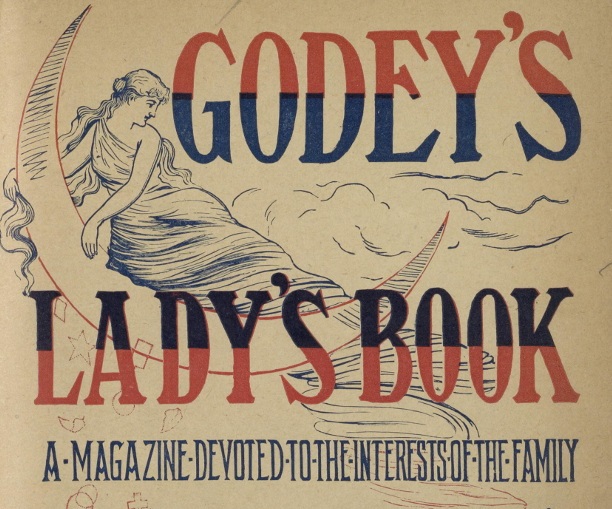
Feature image of Independence Hall from Wikipedia Commons.




